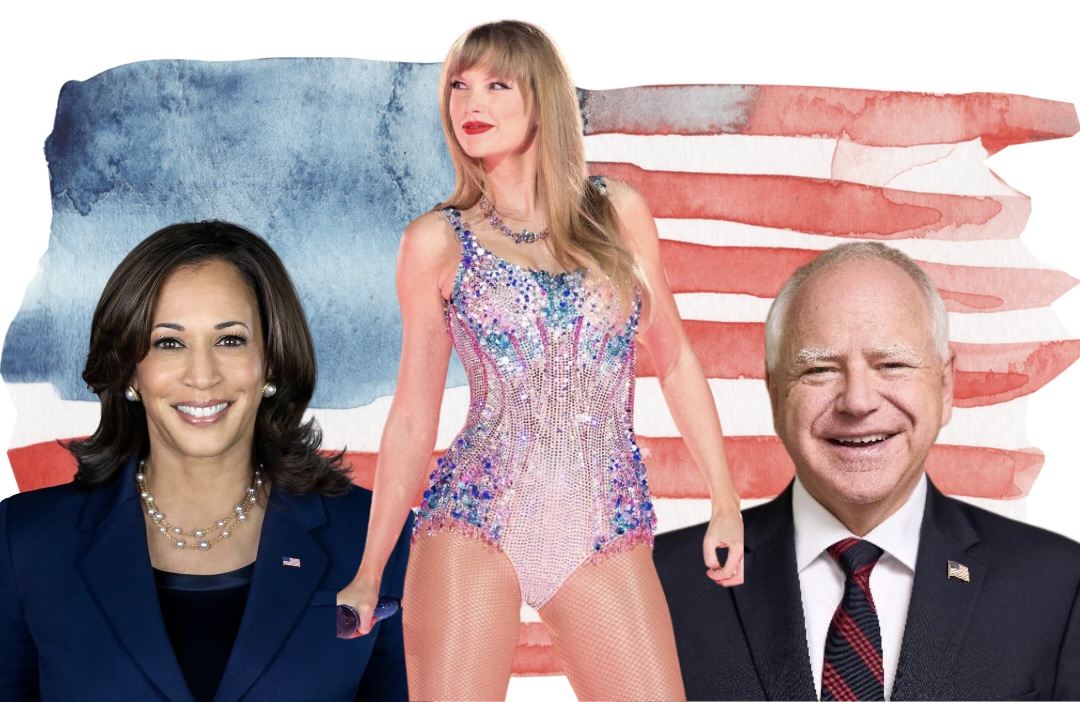The debate over whether celebrities should weigh in on politics is as heated as ever. Some argue they have an obligation to use their platforms to influence change, while others believe they should stay out of public affairs. Within this conversation, I think it is important to acknowledge one of the primary tenets of our country: the freedom of speech. Celebrities are citizens first. Like any of us, they have a right — and perhaps even a responsibility — to voice their opinions. With the enormous reach of figures like Taylor Swift, celebrities’ abilities to amplify issues and drive voter turnout makes their involvement more than just an endorsement, but an act of civic engagement at school. When Swift endorsed the Harris-Walz campaign after the Sept. 10 debate, it was not just another celebrity speaking out — it was a citizen encouraging others to exercise their democratic rights.
Celebrities, regardless of their large platforms, should not be criticized for remaining neutral in politics. Again, they are citizens, and not all citizens are well-versed in every political issue. Hence, celebrities do not have a responsibility to speak out on politics; rather, they have a responsibility to acknowledge the scope of their influence and the impressionability of their audience. With that, it is up to the individual whether they think it is in their best interest and the nation’s best interest for them to voice their opinion in times of political contention.
Swift has had a history of political involvement, making headlines with endorsements and advocacy for causes she deeply values. For instance, in 2018, Swift broke her silence, endorsing Democratic candidates in Tennessee, significantly increasing the turnout of young voters in the state that year. She also used her platform to support the Equality Act in 2019, increasing donations to GLAAD through her music video, “You Need to Calm Down.” Given the success of her previous political endorsement endeavors, it is not surprising that Swift felt the need to speak out in support of the Harris-Walz campaign. She has an undeniable ability to mobilize her large fanbase, and history shows that her previous advocacy efforts have been successful. Therefore, if she felt it was in her and her supporters’ best interests to endorse the campaign, she has every right to do so. However, it’s important to emphasize that this involvement is voluntary, not obligatory. In this case specifically, Swift’s previous successes have cleared the path for her to engage with political matters even further, willingly assuming responsibility.
Any political endorsement is bound to face backlash, and Swift’s endorsement was no exception. Karoline Leavitt, a spokesperson for former president Donald Trump’s campaign, said that the endorsement was “more evidence that the Democrat party has become the party of the wealthy elite.” There is no denying that Swift is a member of a wealthy elite class, earning her spot on the Forbes’ billionaire list this year after the global success of The Eras Tour. However, labeling Swift’s endorsement as a mere reflection of elite politics oversimplifies her motives and ignores the deeper context of her activism. Swift’s wealth does not invalidate the legitimacy of her political voice or diminish the causes she supports.
It is also worth noting that the Trump campaign has received several endorsements from influential wealthy elites, including country star Jason Aldean and former World Wrestling Entertainment wrestler Hulk Hogan. Celebrity endorsements are simply a part of political and civic engagement processes where highly influential individuals exercise their freedoms to mobilize certain bodies of the electorate for issues that resonate with them. Therefore, it is unfair to say that one party embodies the “wealthy elite” because of one specific member. Whether it’s Swift backing progressive values or celebrities like Elon Musk and Dana White supporting conservative causes, the essence of political engagement lies in using one’s platform to advocate for the issues they care about. The opportunity of endorsements lies equally on both sides of the political spectrum where influential members of either party can advocate for their beliefs. Critique should focus on the substance of their stance, not the economic status of the individual, since it is quite natural for celebrities, as citizens, to engage in political discourse.
An important factor to mention is the increase of “cancel culture” within the media and how it plays a role in celebrity endorsements. A Pew Research Center study found that Democrats are more likely to believe that cancel culture is a form of accountability, whereas Republicans are more likely to see it as censorship. It would be unfair to undermine this, as Republican celebrities are more likely to be “canceled” as a result of their political endorsements. Democratic celebrities will often receive backlash from members of the opposing party. However, the idea of “cancel culture” is more dangerous for one’s brand and entertainment career than simply some backlash, as it involves systematic efforts to diminish a celebrity’s public standing. This can lead to significant repercussions, including loss of endorsements, diminished media visibility and even the end of careers. If Republican celebrities are more likely to be victims of cancel culture, it would make sense for them to choose to keep their beliefs to themselves for the sake of their livelihoods. This could be seen as giving the Democrats an unfair advantage, allowing celebrities to express their progressive views more freely without the same level of risk.
Overall, this goes to show that the issue does not lie in celebrity endorsements themselves, but in the way the media reacts to them. These endorsements are a part of a greater political process of civic engagement. Celebrity endorsements can serve as powerful tools for raising awareness and mobilizing support for various causes. However, the way the media frames these endorsements amplifies partisan divides, creating a distorted narrative that sensationalizes or vilifies them.
Laila Sayegh, FCRH ’27, is a political science major from Congers, N.Y.










































































































































































































